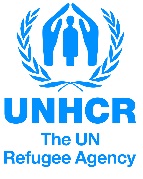| UNHCR meets with partners and donors |
 | L'UNHCR réunit ses partenaires et donateurs | On Thursday May 29, 2014, UNHCR organized an information sharing meeting with donors represented in Niger. Representatives of Mali and Nigeria also attended the meeting. The meeting updated the donors on the evolution of the Malian and the Nigerian situations and presented the responses of UNHCR and its partners in terms of protection and assistance. A highlight of the exchange was the need to strengthen synergies between all actors involved with displaced populations (humanitarian, development, communities and the authorities). |
 | Le jeudi 29 mai, l'UNHCR a organisé une réunion d'échange et d'information à destination des donateurs ayant une représentation au Niger. Les représentations du Nigéria et du Mali ont également participé à cette rencontre. Cette réunion a permis de faire le point avec les donateurs sur les évolutions des situations malienne et nigériane et de présenter les réponses de l'UNHCR et de ses partenaires en termes de protection et d'assistance. Un point saillant des échanges a été la nécessité de renforcer les synergies entre l'ensemble des acteurs engagés auprès des populations déplacées (humanitaire, développement, communautés et autorités). |
|---|
| UNHCR suspends the facilitated repatriation of Malian refugees |
 | Suspension du processus de rapatriement facilité des réfugiés maliens du Niger | In response to the recent security incidents in northern Mali, UNHCR, has since Thursday May 22, 2014 suspended the process of facilitating the repatriation of Malian refugees hosted in Niger. The repatriation facility was initiated in November 2013 in response to requests from refugees who wish to benefit from the support of UNHCR to return to Mali. |
 | En réponse aux récents événements sécuritaires dans le nord Mali, l’UNHCR a suspendu depuis le jeudi 22 mai 2014 le processus de rapatriement facilité des réfugiés maliens vivant au Niger. Le rapatriement facilité avait été amorcé en novembre 2013 en réponse aux demandes émanant des réfugiés qui souhaitaient bénéficier de l’appui de l’UNHCR pour rentrer au Mali. |
|---|
UNHCR Niger scholarships: brighter prospects for young refugees after all
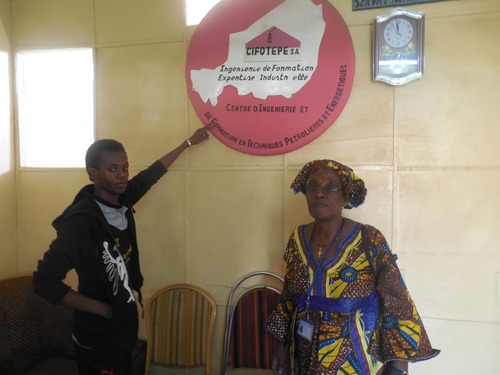
Chadian Refugee Ousmane Wardougou is reading Petroleum and Energy Engineering at the Niamey Centre for Engineering and Training in Petroleum and Energy Techniques (CIFOTEPE SA)
When war broke out in his native Anderamboukane village located in the Malian Azawad northern region, Mohamed Bilal who was already reading science of education at the University of Bamako had no option but to join his fleeing family to neighboring Niger where they lived at the Abala refugee camp.
”To me and most of my friends who were forced to abandon studies, all was bleak before us” he says, “but Alhamdoulilah (thanks be to God), in August 2013 the DAFI scholarship offer was announced by UNHCR Niger for studies in Senegal ”, recalls the 25 year old Bilal who is currently studying project management at “école des cadres” in Niamey. He says even though in the end most of them were not successful at the selection process for the German programme, UNHCR gave them a second chance and offered them local scholarships. Today two of them are comfortably pursuing higher studies. “The scholarship has rekindled hope and joy in my life and I will evidently serve as a good example for my fellow brothers and sisters who are in the camps or have precipitated their return to Mali”, he explains with mixed feelings. Voluntary repatriation has abruptly ended the education of thousands of Malian pupils and students at the behest of their parents.
To another Malian compatriot, the scholarship offer is a dream comes true because since his arrival in Niger, he had pressurized UNHCR and the authorities of Niger for a scholarship to continue his studies. “I received many unfulfilled promises until June 6, 2013 when finally the UNHCR Representative made it a reality after a long wait. And today, my patience has paid up; today I have a UNHCR scholarship; thanks be to God”. According to Mahamane Moussa 22, the scholarship has impacted his life very much. “If by the grace of God I return to my country one day, I will certainly contribute to the development of my country with the education I am receiving in my country of asylum.” concludes Mahamane who is studying project management in the same institution as Bilal.
Both Bilal and Mahamane are not only concerned but excited to sensitize their fellow compatriots in exile on the merits of continuing with their education and wish that UNHCR should facilitate this initiative for them during the holidays.
Even though opportunities for pursuing higher education are extremely limited, UNHCR managed to provide scholarships for few Malians and other refugees of other nationalities. So far, fifteen undergraduate refugees are currently studying in higher institutions on UNHCR scholarships in Niger. Few Chadian refugees benefit from the German DAFI programme. Prospects for graduate refugees are not all gleam as the socio-economic conditions are very difficult in Niger, one of the poorest countries on earth, which put limitations on opportunities for successful local integration. UNHCR is also engaged in advocacy to promote the implementation of the ECOWAS protocols on the freedom of movement in order to facilitate the issuance of identity cards / passports to refugees to improve on their chances of employment in the sub-region.
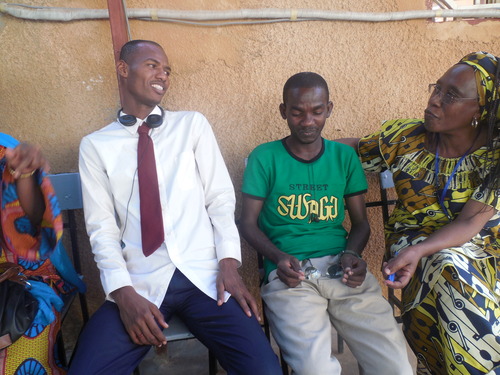
Malian (refugees) students: Mahammane & Bilal with UNHCR education staff, Muthoni © UNHCR
| Voluntary repatriation of Malian refugees in Niamey |
 | Rapatriement volontaire pour les réfugiés maliens de Niamey | In 2014, UNHCR Niger launched the second operation to facilitate the voluntary repatriation of Malian refugees. The process began with urban refugees in Niamey and will continue in other locations where refugees seek UNHCR’s assistance to return.
|
 |
En 2014, l’UNHCR Niger a lancé la deuxième opération de facilitation du rapatriement volontaire des réfugiés maliens.Le processus commence avec les réfugiés urbains de Niamey et concernera toutes les zones où des réfugiés cherchent l’assistance de l’UNHCR pour rentrer.
|
|---|
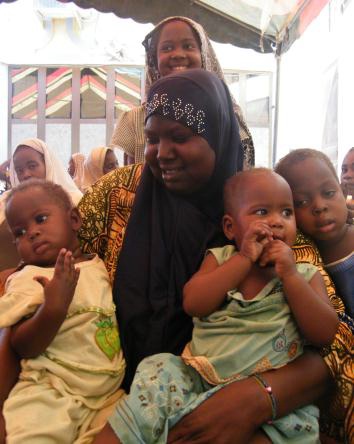
Oumou is happy to return home to Mali to introduce her baby twins to her family.©UNHCR/B.Moreno
A Bosso, les effets et les défis de la stratégie hors camp
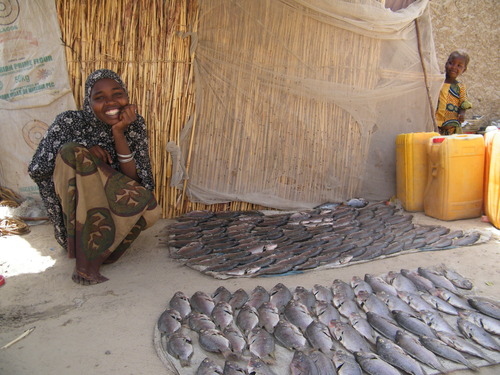
Dans la région de Diffa, il n’existe pas de camp pour les populations ayant fui le Nigéria. Installer un camp est une des options pour appuyer les réfugiés. Elle a ses avantages et ses inconvénients. La stratégie hors camp en est une autre. Elle rend difficile la mise en place opérationnelle et logistique des interventions mais permet de ne pas inhiber les initiatives individuelles et les arrangements communautaires tout comme elle favorise, dès la phase d’urgence, l’intégration socio-économique des réfugiés. La ville de Bosso située à quelques pas du Nigéria et du Lac Tchad en est un exemple intéressant.
Lire l'intégralité
Regard artistique sur les réfugiés maliens
Titouan Lamazou, artiste de l’UNESCO pour la Paix, est de retour au Niger après s’y être rendu en 2013. Son projet artistique est dénommé « Retour à Tombouctou ». Titouan revient à la rencontre des personnes qu’il a connues lors de ses séjours dans le nord Mali en 1998 et 2000. Certaines sont aujourd’hui réfugiées en Mauritanie, au Burkina Faso et au Niger. L’UNHCR se réjouit de voir le regard artistique de Titouan se poser à nouveau sur ces hommes et ces femmes.
Télécharger le projet de Titouan Lamazou

Improving Client Satisfaction: Urban Refugees Given the Right to Complain
Refugees can express their grievances and formally lodge a complaint against the staff and the agencies operating in the Guichet Unique (Cadev, CNE, Save the Children, UNHCR). Three independent legal workers are in place to register the complaints and transmit them to special committees that will examine and find a resolution to each individual and collective case presented to them. The objective of the complaints mechanisms is to prevent and respond to potential abuses that affect the rights of the refugees. The new initiative aims at improving the delivery of services in the Guichet Unique and monitoring the quality of partnerships as well as the level of satisfaction of refugees to our programme.
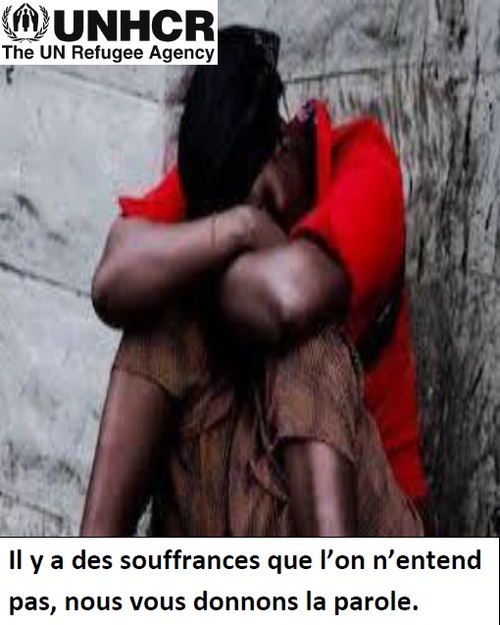
Les Comités d’Action Communautaire : des acteurs essentiels dans l’accueil de la population déplacée
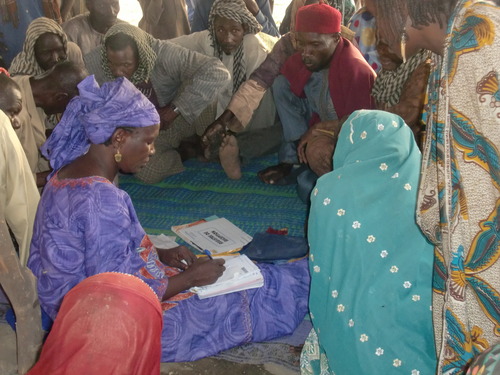
Beram du CAC de Bosso en train de procéder à l’enregistrement de nouveaux arrivants. ©UNHCR
See the English version
Dans son travail auprès des populations déplacées de la région de Diffa, l'UNHCR s'attache à prendre en compte et à renforcer les dynamiques insufflées par les populations locales. Parmi ces dynamiques se trouvent les Comités d'Action Communautaire (CAC). Ces groupes d'individus représentatifs de l’ arène locale sont aujourd'hui des acteurs incontournables dans l'aide aux réfugiés.
Télécharger l'article http://data.unhcr.org/SahelSituation/download.php?id=865
Récupérer la vue pour y voir un peu plus loin / Recover your view to see a little further

De gauche à droite : Koila, Aissa, Bintou. ©UNHCR/B.Moreno
| Le 18 mars 2014, le HCR a permis à 29 réfugiés ayant fui le Nigéria de bénéficier d'une opération de la cataracte. Au Niger comme au Nigéria, les conditions socio-économiques des malvoyants et de leurs familles sont caractérisées par une extrême précarité. Pour ces personnes, récupérer la vue est synonyme d'espoir et de regain de dignité. Téléchargez l'article http://data.unhcr.org/SahelSituation/download.php?id=854 |
 | On 18 March 2014, UNHCR has helped 29 refugees who fled Nigeria to benefit from cataract surgery. In Niger and Nigeria, the social and economic conditions of the visually impaired persons and their families are characterized by extreme poverty. For these people, recovering the eye sight means hope and regained dignity.
. |
|---|
Journal Liberation: “Les réfugiés ont autant peur de l'armée que de Boko Haram”
Journal Liberation du mercredi 12 mars 2014
Par JEAN-LOUIS LE TOUZET
Envoyé spécial à Bosso et Diffa (Niger)
Les villages du Niger proches de la frontière accueillent de milliers des personnes qui fuient les tueries des islamistes ou les représailles des militaires au Nigéria.
Téléchargez l'article http//:data.unhcr.org/SahelSituation/download.php?id=852

Photo Benedicte Kurwen, the New York Times, REDUX REA.
